
agency
A fast and minimal framework for building agent-integrated systems
Stars: 378
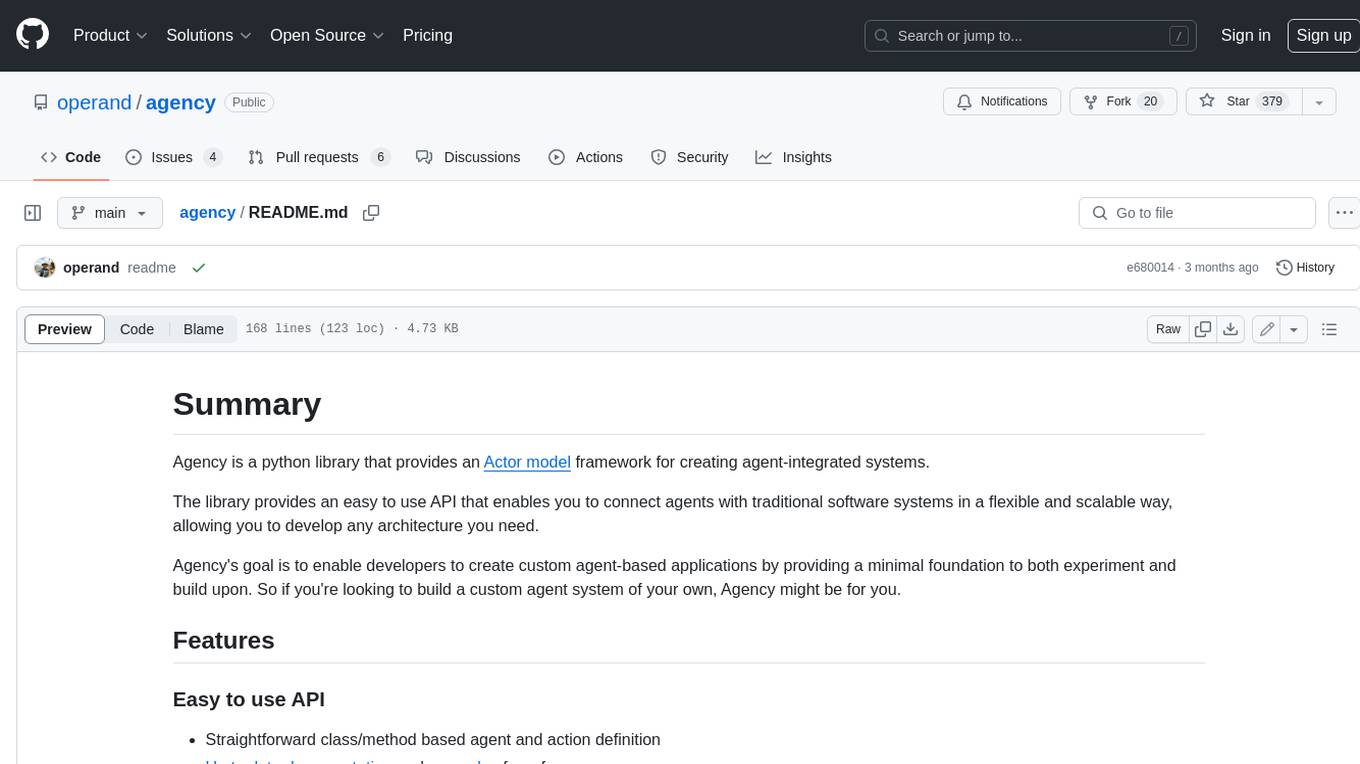
Agency is a python library that provides an Actor model framework for creating agent-integrated systems. It offers an easy-to-use API for connecting agents with traditional software systems, enabling flexible and scalable architectures. Agency aims to empower developers in creating custom agent-based applications by providing a foundation for experimentation and development. Key features include an intuitive API, performance and scalability through multiprocessing and AMQP support, observability and control with action and lifecycle callbacks, access policies, and detailed logging. The library also includes a demo application with multiple agent examples, OpenAI agent examples, HuggingFace transformers agent example, operating system access, Gradio UI, and Docker configuration for reference and development.
README:
Agency is a python library that provides an Actor model framework for creating agent-integrated systems.
The library provides an easy to use API that enables you to connect agents with traditional software systems in a flexible and scalable way, allowing you to develop any architecture you need.
Agency's goal is to enable developers to create custom agent-based applications by providing a minimal foundation to both experiment and build upon. So if you're looking to build a custom agent system of your own, Agency might be for you.
- Straightforward class/method based agent and action definition
- Up to date documentation and examples for reference
- Supports multiprocessing and multithreading for concurrency
- AMQP support for networked agent systems
- Action and lifecycle callbacks
- Access policies and permission callbacks
- Detailed logging
Demo application available at examples/demo
- Multiple agent examples for experimentation
- Two OpenAI agent examples
- HuggingFace transformers agent example
- Operating system access
- Includes Gradio UI
- Docker configuration for reference and development
In Agency, all entities are represented as instances of the Agent class. This
includes all AI-driven agents, software interfaces, or human users that may
communicate as part of your application.
All agents may expose "actions" that other agents can discover and invoke at run time. An example of a simple agent could be:
class CalculatorAgent(Agent):
@action
def add(a, b):
return a + bThis defines an agent with a single action: add. Other agents will be able
to call this method by sending a message to an instance of CalculatorAgent and
specifying the add action. For example:
other_agent.send({
'to': 'CalcAgent',
'action': {
'name': 'add',
'args': {
'a': 1,
'b': 2,
}
},
})Actions may specify an access policy, allowing you to control access for safety.
@action(access_policy=ACCESS_PERMITTED) # This allows the action at any time
def add(a, b):
...
@action(access_policy=ACCESS_REQUESTED) # This requires review before the action
def add(a, b):
...Agents may also define callbacks for various purposes:
class CalculatorAgent(Agent):
...
def before_action(self, message: dict):
"""Called before an action is attempted"""
def after_action(self, message: dict, return_value: str, error: str):
"""Called after an action is attempted"""
def after_add(self):
"""Called after the agent is added to a space and may begin communicating"""
def before_remove(self):
"""Called before the agent is removed from the space"""A Space is how you connect your agents together. An agent cannot communicate
with others until it is added to a common Space.
There are two included Space implementations to choose from:
-
LocalSpace- which connects agents within the same application. -
AMQPSpace- which connects agents across a network using an AMQP server like RabbitMQ.
Finally, here is a simple example of creating a LocalSpace and adding two
agents to it.
space = LocalSpace()
space.add(CalculatorAgent, "CalcAgent")
space.add(MyAgent, "MyAgent")
# The agents above can now communicateThese are just the basic features that Agency provides. For more information please see the help site.
pip install agencyor
poetry add agencyThe demo application is maintained as an experimental development environment and a showcase for library features. It includes multiple agent examples which may communicate with eachother and supports a "slash" syntax for invoking actions as an agent yourself.
To run the demo, please follow the directions at examples/demo.
The following is a screenshot of the Gradio UI that demonstrates the example
OpenAIFunctionAgent following orders and interacting with the Host agent.
Please do!
If you're considering a contribution, please check out the contributing guide.
If you have any suggestions or otherwise, feel free to add an issue or open a discussion.
For Tasks:
Click tags to check more tools for each tasksFor Jobs:
Alternative AI tools for agency
Similar Open Source Tools

agency
Agency is a python library that provides an Actor model framework for creating agent-integrated systems. It offers an easy-to-use API for connecting agents with traditional software systems, enabling flexible and scalable architectures. Agency aims to empower developers in creating custom agent-based applications by providing a foundation for experimentation and development. Key features include an intuitive API, performance and scalability through multiprocessing and AMQP support, observability and control with action and lifecycle callbacks, access policies, and detailed logging. The library also includes a demo application with multiple agent examples, OpenAI agent examples, HuggingFace transformers agent example, operating system access, Gradio UI, and Docker configuration for reference and development.
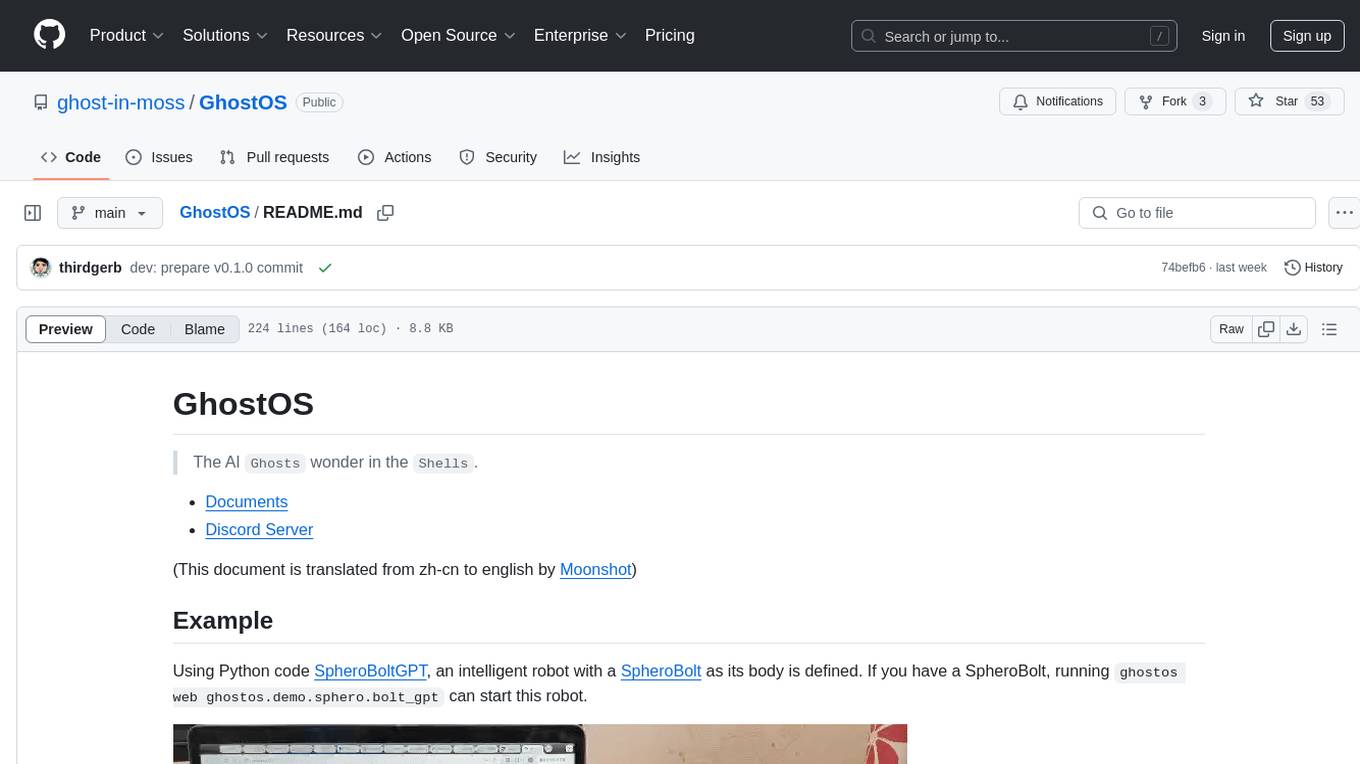
GhostOS
GhostOS is an AI Agent framework designed to replace JSON Schema with a Turing-complete code interaction interface (Moss Protocol). It aims to create intelligent entities capable of continuous learning and growth through code generation and project management. The framework supports various capabilities such as turning Python files into web agents, real-time voice conversation, body movements control, and emotion expression. GhostOS is still in early experimental development and focuses on out-of-the-box capabilities for AI agents.
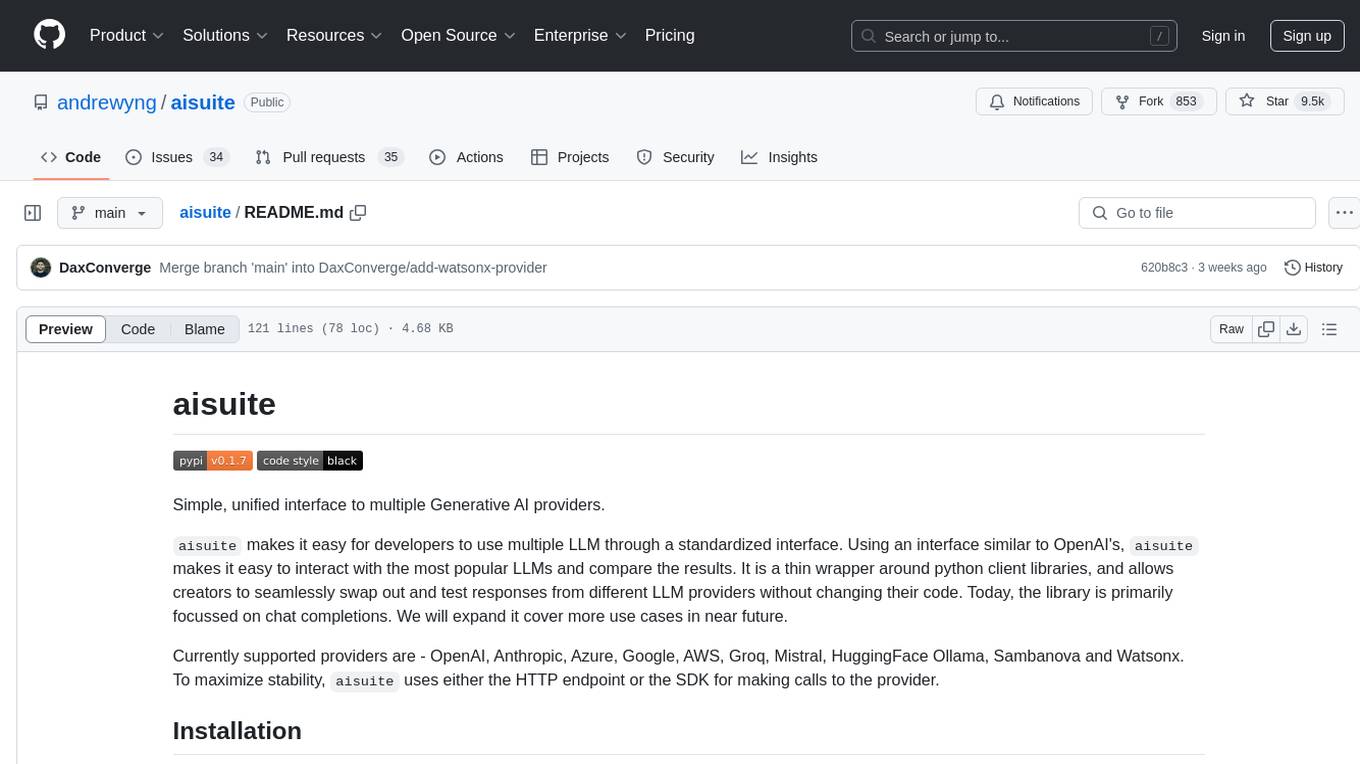
aisuite
Aisuite is a simple, unified interface to multiple Generative AI providers. It allows developers to easily interact with various Language Model (LLM) providers like OpenAI, Anthropic, Azure, Google, AWS, and more through a standardized interface. The library focuses on chat completions and provides a thin wrapper around python client libraries, enabling creators to test responses from different LLM providers without changing their code. Aisuite maximizes stability by using HTTP endpoints or SDKs for making calls to the providers. Users can install the base package or specific provider packages, set up API keys, and utilize the library to generate chat completion responses from different models.
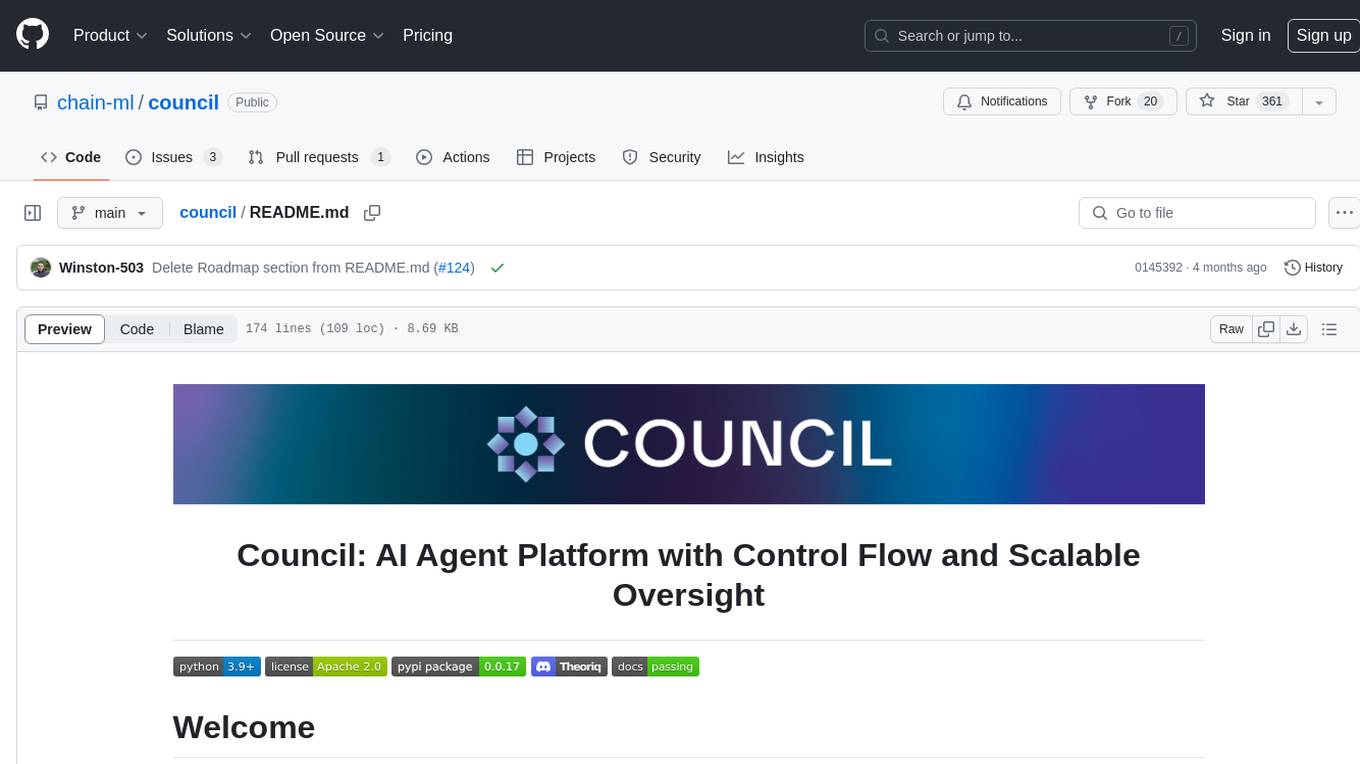
council
Council is an open-source platform designed for the rapid development and deployment of customized generative AI applications using teams of agents. It extends the LLM tool ecosystem by providing advanced control flow and scalable oversight for AI agents. Users can create sophisticated agents with predictable behavior by leveraging Council's powerful approach to control flow using Controllers, Filters, Evaluators, and Budgets. The framework allows for automated routing between agents, comparing, evaluating, and selecting the best results for a task. Council aims to facilitate packaging and deploying agents at scale on multiple platforms while enabling enterprise-grade monitoring and quality control.
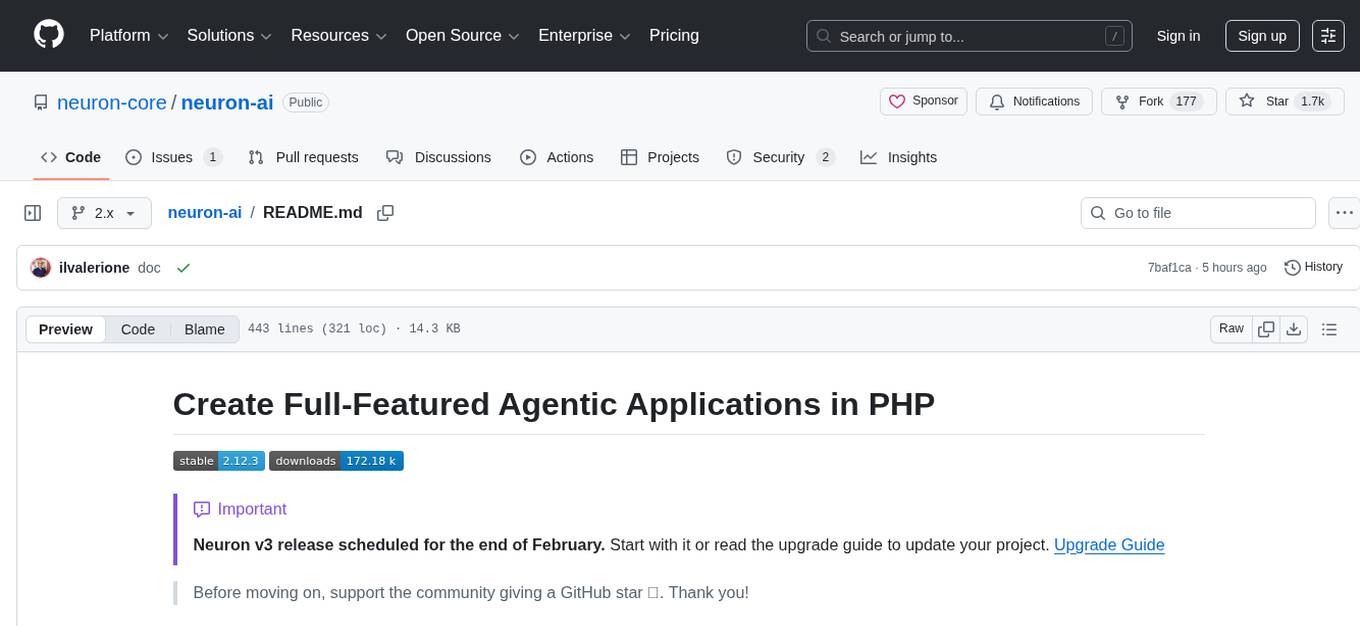
neuron-ai
Neuron is a PHP framework for creating and orchestrating AI Agents, providing tools for the entire agentic application development lifecycle. It allows integration of AI entities in existing PHP applications with a powerful and flexible architecture. Neuron offers tutorials and educational content to help users get started using AI Agents in their projects. The framework supports various LLM providers, tools, and toolkits, enabling users to create fully functional agents for tasks like data analysis, chatbots, and structured output. Neuron also facilitates monitoring and debugging of AI applications, ensuring control over agent behavior and decision-making processes.
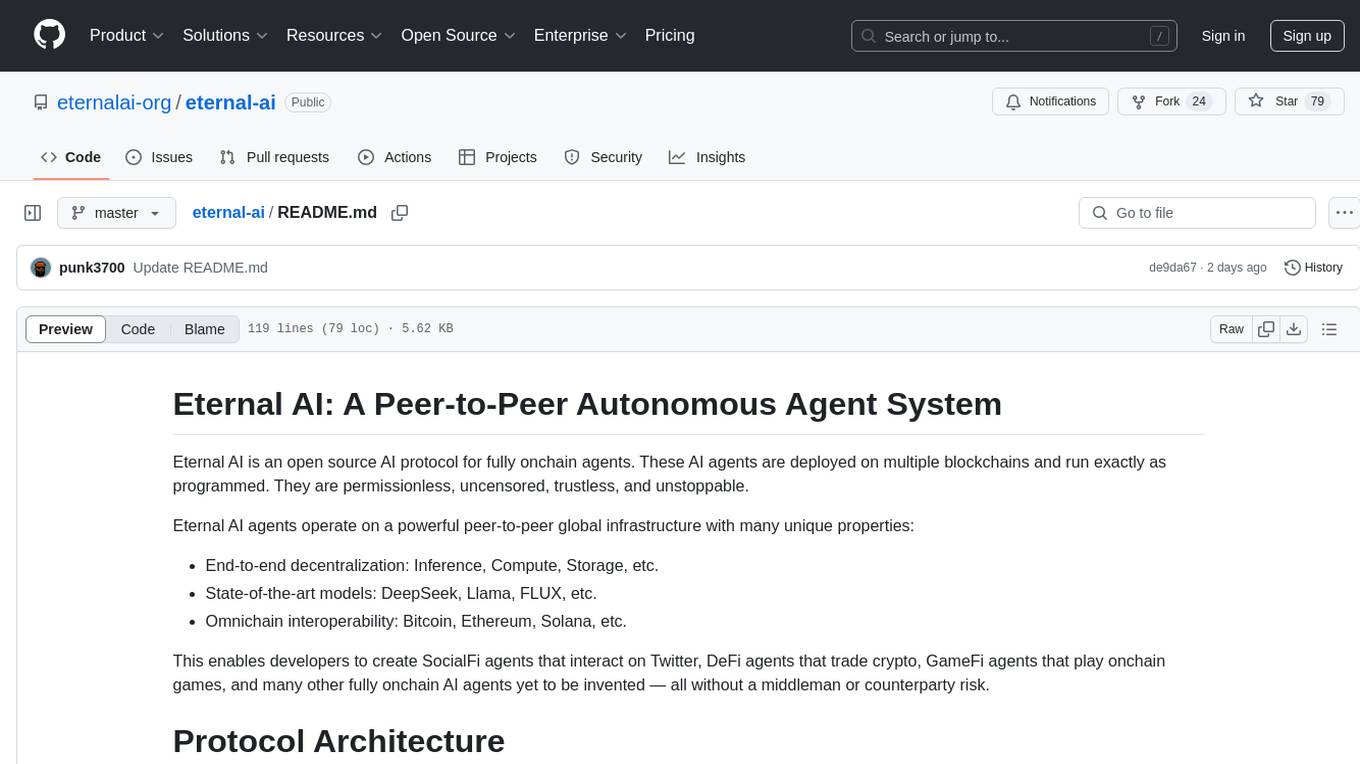
eternal-ai
Eternal AI is an open source AI protocol for fully onchain agents, enabling developers to create various types of onchain AI agents without middlemen. It operates on a decentralized infrastructure with state-of-the-art models and omnichain interoperability. The protocol architecture includes components like ai-kernel, decentralized-agents, decentralized-inference, decentralized-compute, agent-as-a-service, and agent-studio. Ongoing research projects include cuda-evm, nft-ai, and physical-ai. The system requires Node.js, npm, Docker Desktop, Go, and Ollama for installation. The 'eai' CLI tool allows users to create agents, fetch agent info, list agents, and chat with agents. Design principles focus on decentralization, trustlessness, production-grade quality, and unified agent interface. Featured integrations can be quickly implemented, and governance will be overseen by EAI holders in the future.
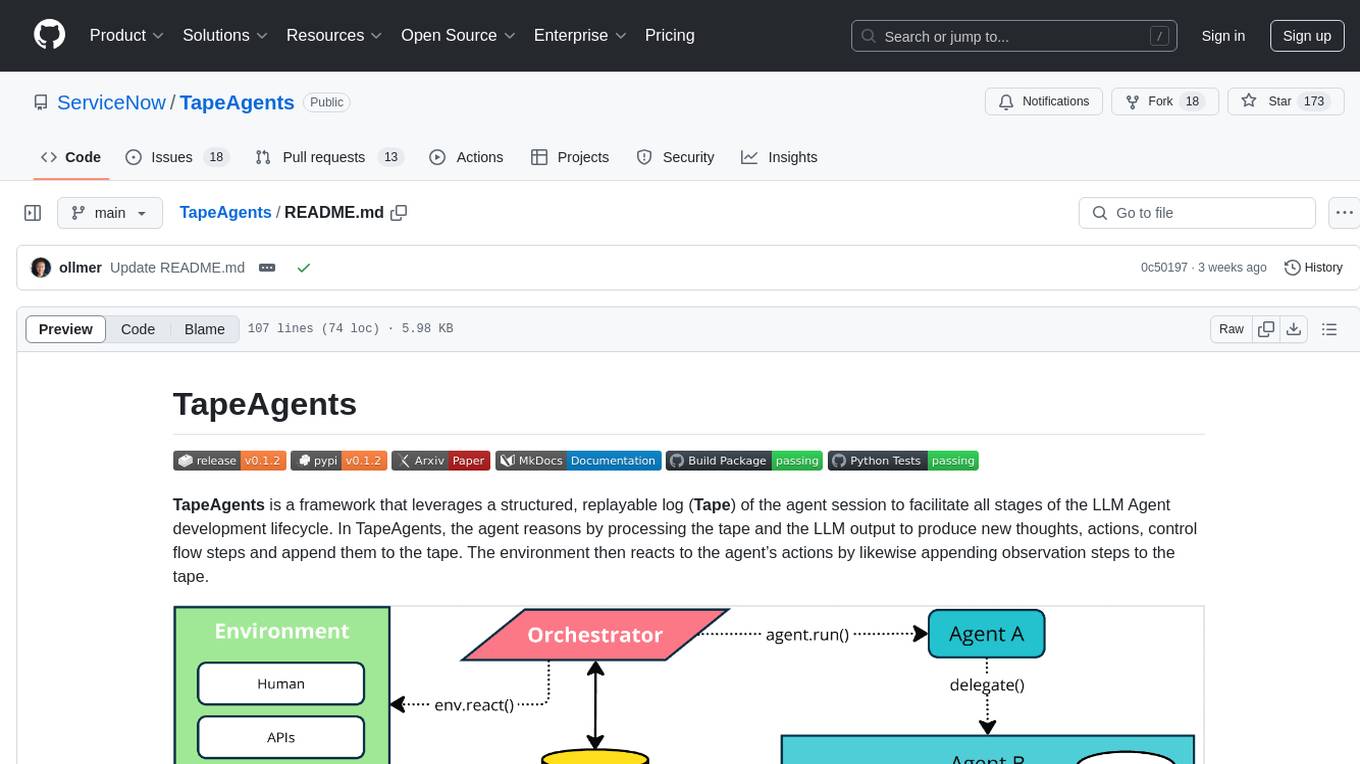
TapeAgents
TapeAgents is a framework that leverages a structured, replayable log of the agent session to facilitate all stages of the LLM Agent development lifecycle. The agent reasons by processing the tape and the LLM output to produce new thoughts, actions, control flow steps, and append them to the tape. Key features include building agents as low-level state machines or high-level multi-agent team configurations, debugging agents with TapeAgent studio or TapeBrowser apps, serving agents with response streaming, and optimizing agent configurations using successful tapes. The Tape-centric design of TapeAgents provides ultimate flexibility in project development, allowing access to tapes for making prompts, generating next steps, and controlling agent behavior.
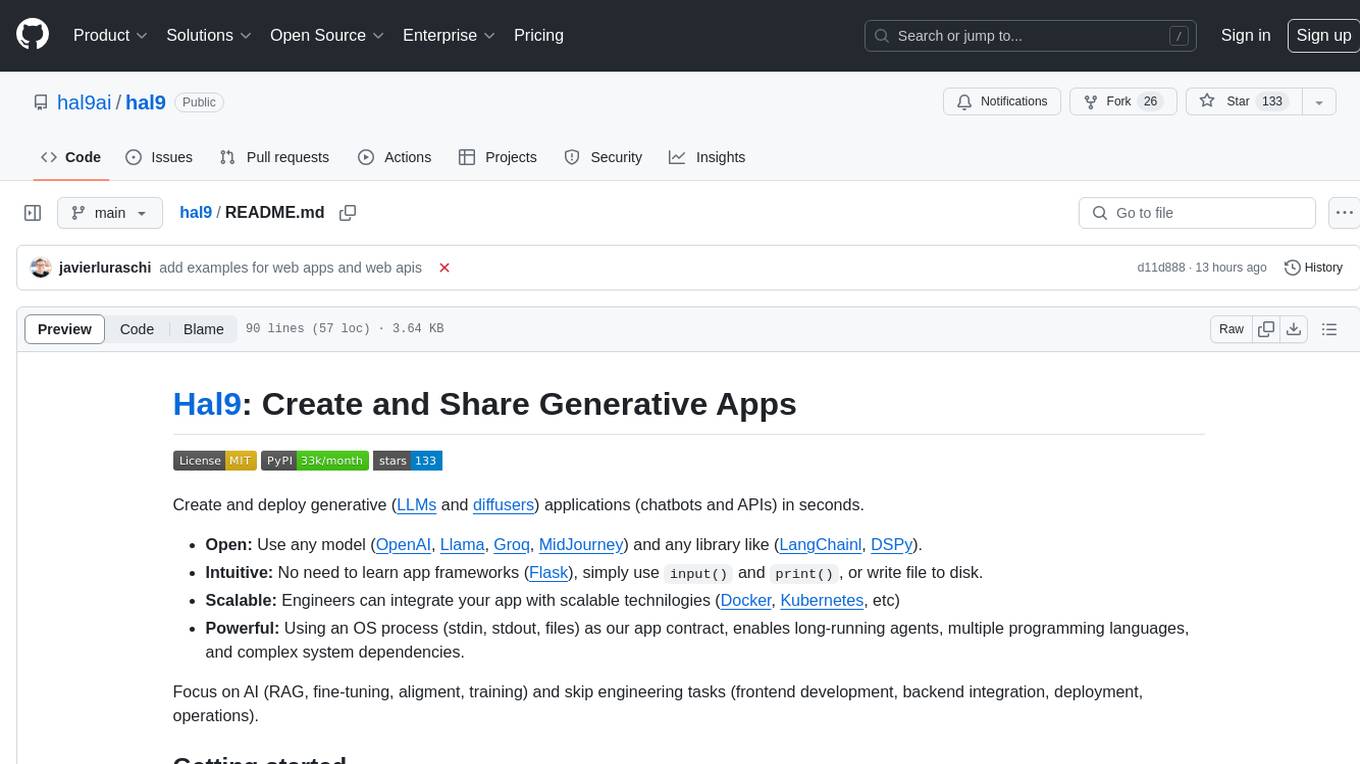
hal9
Hal9 is a tool that allows users to create and deploy generative applications such as chatbots and APIs quickly. It is open, intuitive, scalable, and powerful, enabling users to use various models and libraries without the need to learn complex app frameworks. With a focus on AI tasks like RAG, fine-tuning, alignment, and training, Hal9 simplifies the development process by skipping engineering tasks like frontend development, backend integration, deployment, and operations.

agentok
Agentok Studio is a visual tool built for AutoGen, a cutting-edge agent framework from Microsoft and various contributors. It offers intuitive visual tools to simplify the construction and management of complex agent-based workflows. Users can create workflows visually as graphs, chat with agents, and share flow templates. The tool is designed to streamline the development process for creators and developers working on next-generation Multi-Agent Applications.
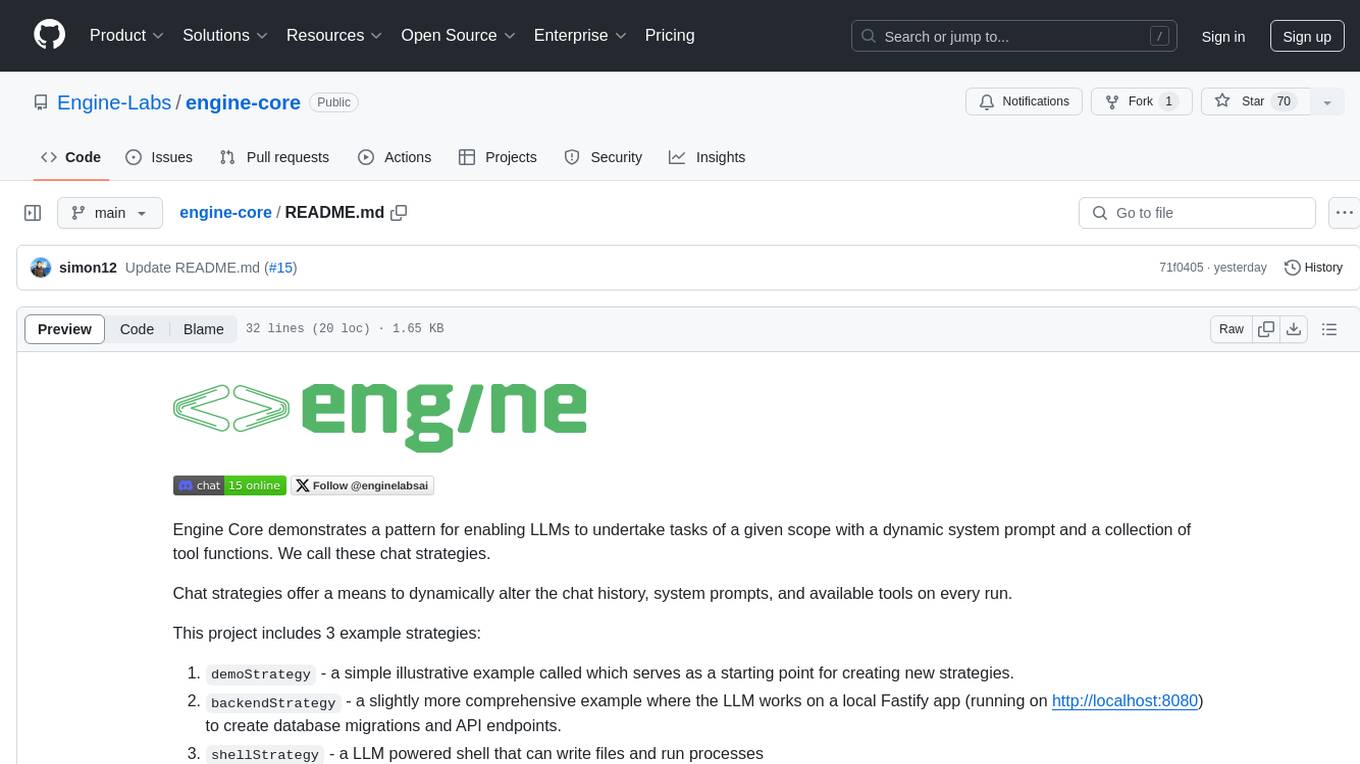
engine-core
Engine Core is a project that demonstrates a pattern for enabling Large Language Models (LLMs) to undertake tasks with a dynamic system prompt and a collection of tool functions known as chat strategies. These strategies allow for the dynamic alteration of chat history, system prompts, and available tools on every run. The project includes example strategies such as demoStrategy, backendStrategy, and shellStrategy. Additionally, LLM integrations like Anthropic or OpenAI have been extracted into adapters to enable running the same app code and strategies while switching foundation models.
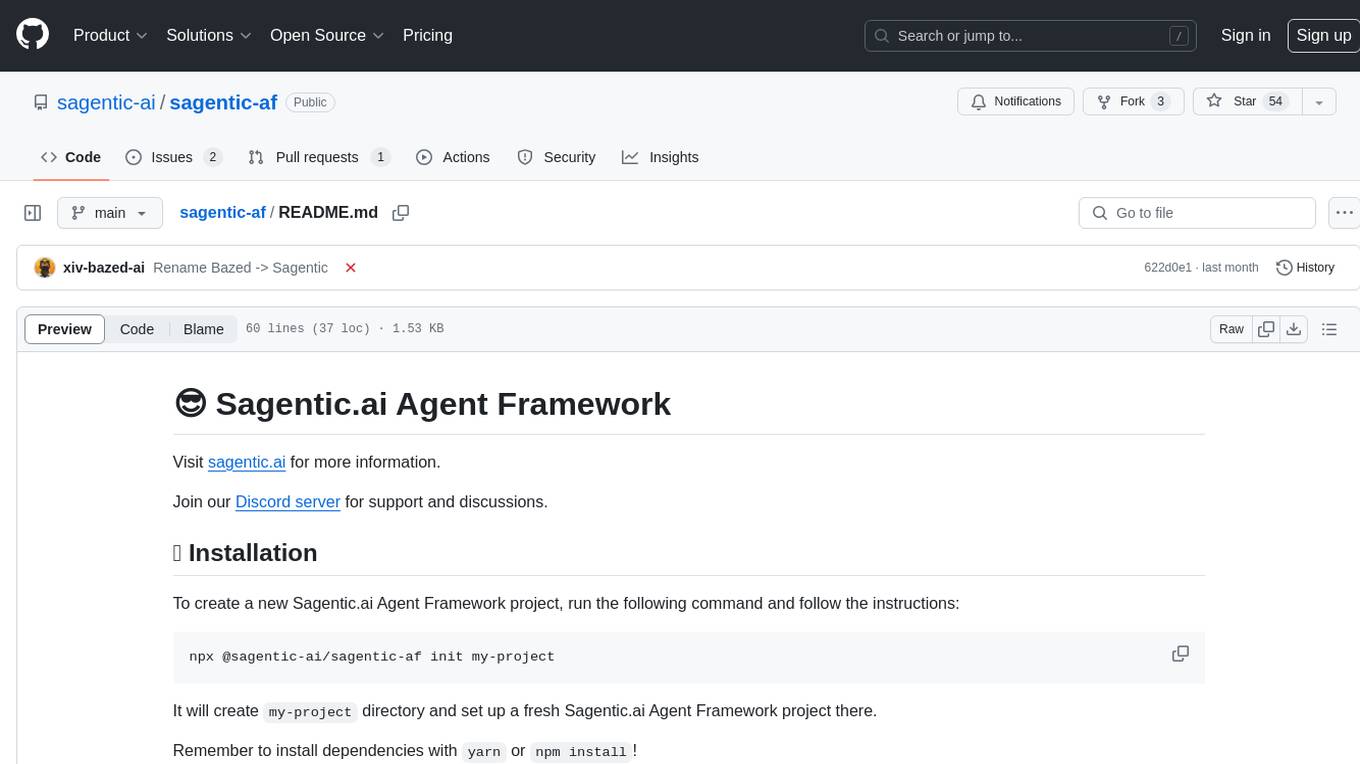
sagentic-af
Sagentic.ai Agent Framework is a tool for creating AI agents with hot reloading dev server. It allows users to spawn agents locally by calling specific endpoint. The framework comes with detailed documentation and supports contributions, issues, and feature requests. It is MIT licensed and maintained by Ahyve Inc.
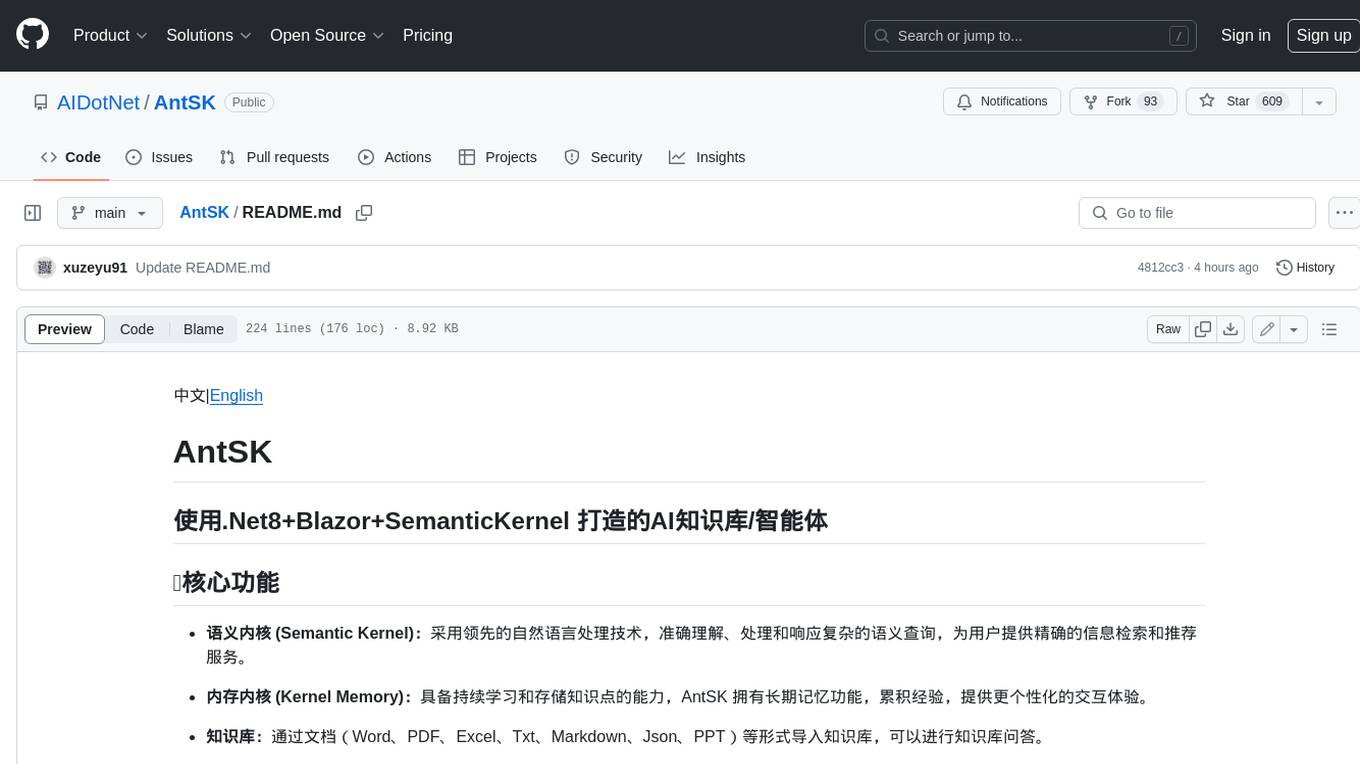
AntSK
AntSK is an AI knowledge base/agent built with .Net8+Blazor+SemanticKernel. It features a semantic kernel for accurate natural language processing, a memory kernel for continuous learning and knowledge storage, a knowledge base for importing and querying knowledge from various document formats, a text-to-image generator integrated with StableDiffusion, GPTs generation for creating personalized GPT models, API interfaces for integrating AntSK into other applications, an open API plugin system for extending functionality, a .Net plugin system for integrating business functions, real-time information retrieval from the internet, model management for adapting and managing different models from different vendors, support for domestic models and databases for operation in a trusted environment, and planned model fine-tuning based on llamafactory.
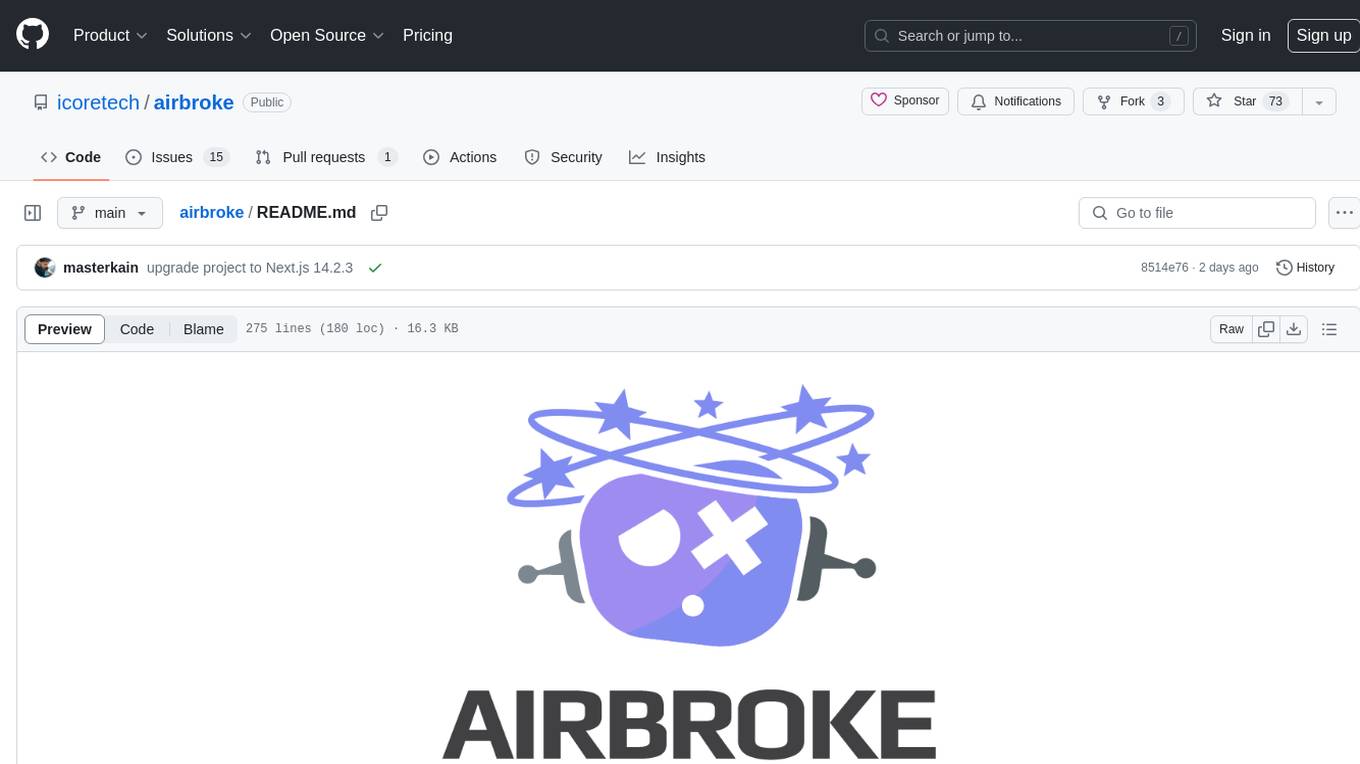
airbroke
Airbroke is an open-source error catcher tool designed for modern web applications. It provides a PostgreSQL-based backend with an Airbrake-compatible HTTP collector endpoint and a React-based frontend for error management. The tool focuses on simplicity, maintaining a small database footprint even under heavy data ingestion. Users can ask AI about issues, replay HTTP exceptions, and save/manage bookmarks for important occurrences. Airbroke supports multiple OAuth providers for secure user authentication and offers occurrence charts for better insights into error occurrences. The tool can be deployed in various ways, including building from source, using Docker images, deploying on Vercel, Render.com, Kubernetes with Helm, or Docker Compose. It requires Node.js, PostgreSQL, and specific system resources for deployment.
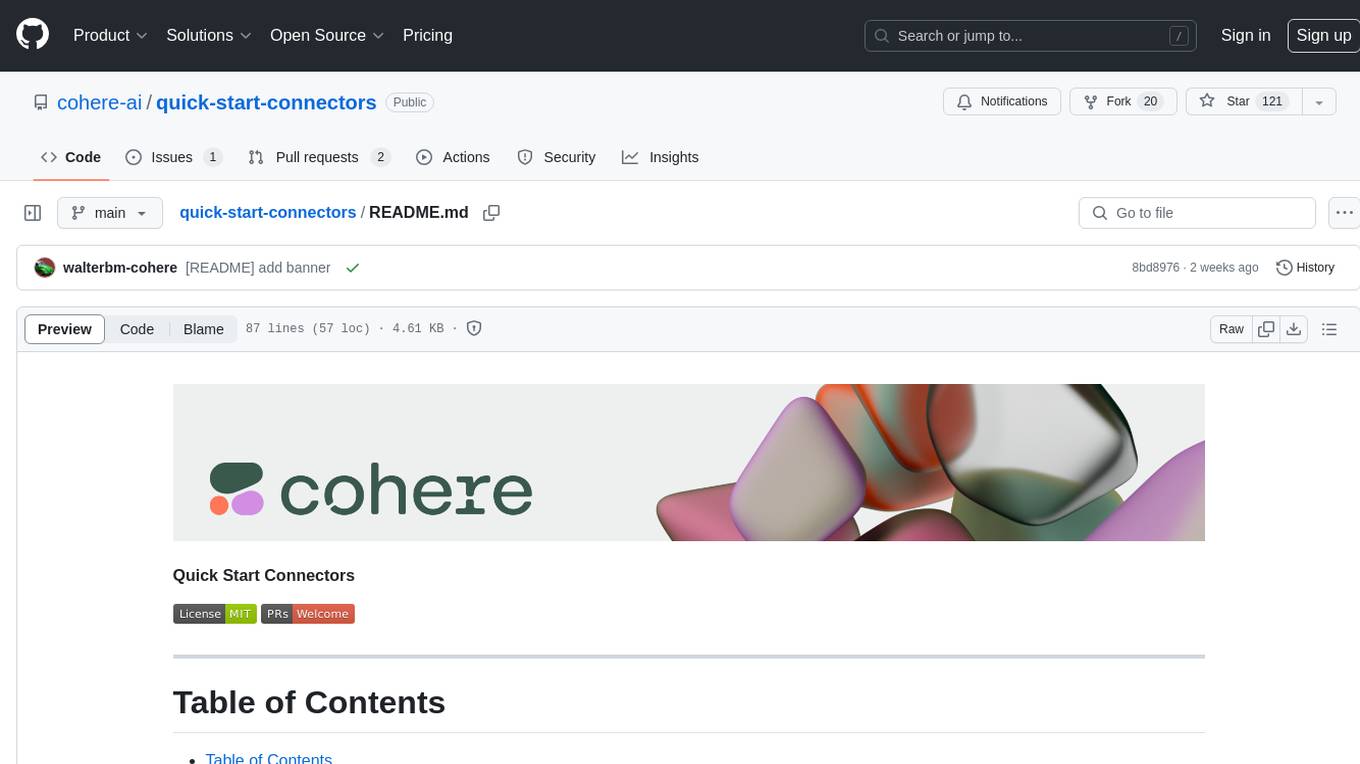
quick-start-connectors
Cohere's Build-Your-Own-Connector framework allows integration of Cohere's Command LLM via the Chat API endpoint to any datastore/software holding text information with a search endpoint. Enables user queries grounded in proprietary information. Use-cases include question/answering, knowledge working, comms summary, and research. Repository provides code for popular datastores and a template connector. Requires Python 3.11+ and Poetry. Connectors can be built and deployed using Docker. Environment variables set authorization values. Pre-commits for linting. Connectors tailored to integrate with Cohere's Chat API for creating chatbots. Connectors return documents as JSON objects for Cohere's API to generate answers with citations.
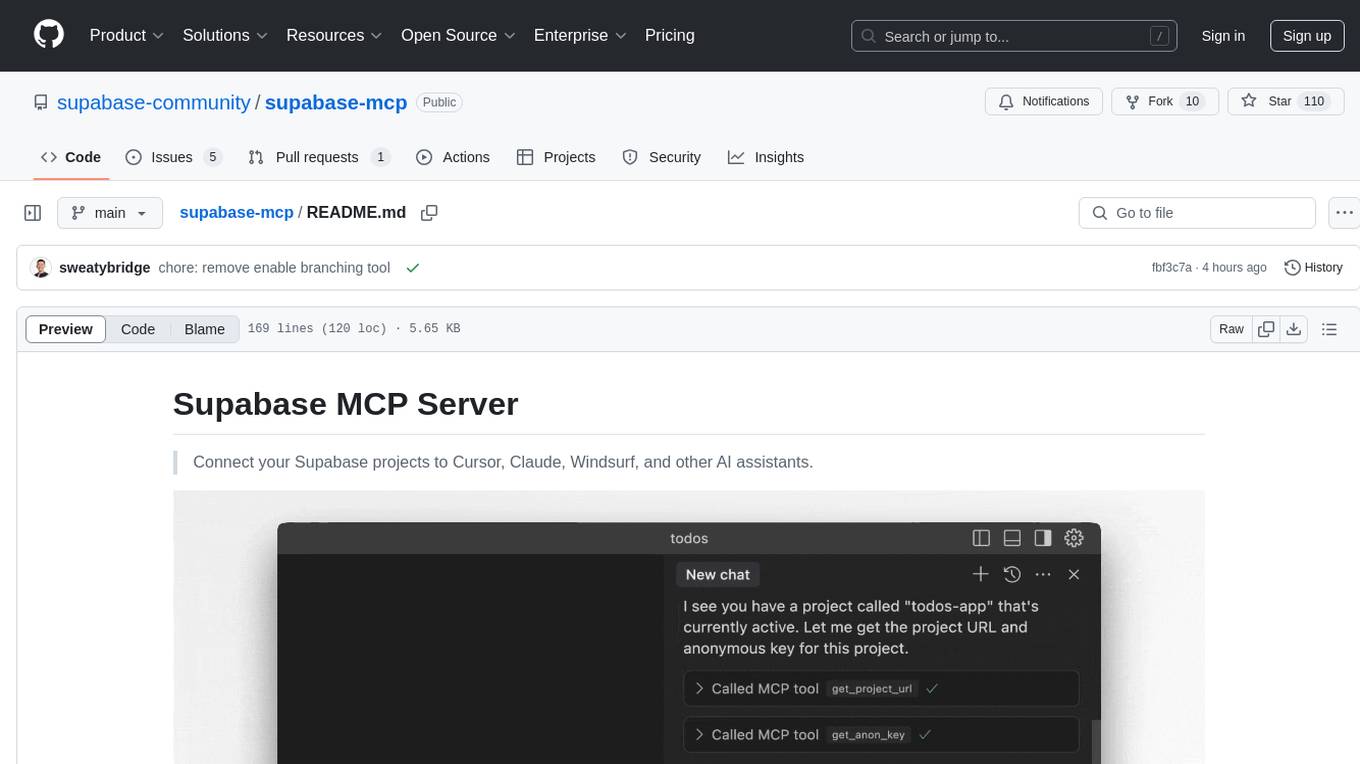
supabase-mcp
Supabase MCP Server standardizes how Large Language Models (LLMs) interact with Supabase, enabling AI assistants to manage tables, fetch config, and query data. It provides tools for project management, database operations, project configuration, branching (experimental), and development tools. The server is pre-1.0, so expect some breaking changes between versions.

project_alice
Alice is an agentic workflow framework that integrates task execution and intelligent chat capabilities. It provides a flexible environment for creating, managing, and deploying AI agents for various purposes, leveraging a microservices architecture with MongoDB for data persistence. The framework consists of components like APIs, agents, tasks, and chats that interact to produce outputs through files, messages, task results, and URL references. Users can create, test, and deploy agentic solutions in a human-language framework, making it easy to engage with by both users and agents. The tool offers an open-source option, user management, flexible model deployment, and programmatic access to tasks and chats.
For similar tasks

agency
Agency is a python library that provides an Actor model framework for creating agent-integrated systems. It offers an easy-to-use API for connecting agents with traditional software systems, enabling flexible and scalable architectures. Agency aims to empower developers in creating custom agent-based applications by providing a foundation for experimentation and development. Key features include an intuitive API, performance and scalability through multiprocessing and AMQP support, observability and control with action and lifecycle callbacks, access policies, and detailed logging. The library also includes a demo application with multiple agent examples, OpenAI agent examples, HuggingFace transformers agent example, operating system access, Gradio UI, and Docker configuration for reference and development.
For similar jobs

sweep
Sweep is an AI junior developer that turns bugs and feature requests into code changes. It automatically handles developer experience improvements like adding type hints and improving test coverage.

teams-ai
The Teams AI Library is a software development kit (SDK) that helps developers create bots that can interact with Teams and Microsoft 365 applications. It is built on top of the Bot Framework SDK and simplifies the process of developing bots that interact with Teams' artificial intelligence capabilities. The SDK is available for JavaScript/TypeScript, .NET, and Python.

ai-guide
This guide is dedicated to Large Language Models (LLMs) that you can run on your home computer. It assumes your PC is a lower-end, non-gaming setup.

classifai
Supercharge WordPress Content Workflows and Engagement with Artificial Intelligence. Tap into leading cloud-based services like OpenAI, Microsoft Azure AI, Google Gemini and IBM Watson to augment your WordPress-powered websites. Publish content faster while improving SEO performance and increasing audience engagement. ClassifAI integrates Artificial Intelligence and Machine Learning technologies to lighten your workload and eliminate tedious tasks, giving you more time to create original content that matters.

chatbot-ui
Chatbot UI is an open-source AI chat app that allows users to create and deploy their own AI chatbots. It is easy to use and can be customized to fit any need. Chatbot UI is perfect for businesses, developers, and anyone who wants to create a chatbot.

BricksLLM
BricksLLM is a cloud native AI gateway written in Go. Currently, it provides native support for OpenAI, Anthropic, Azure OpenAI and vLLM. BricksLLM aims to provide enterprise level infrastructure that can power any LLM production use cases. Here are some use cases for BricksLLM: * Set LLM usage limits for users on different pricing tiers * Track LLM usage on a per user and per organization basis * Block or redact requests containing PIIs * Improve LLM reliability with failovers, retries and caching * Distribute API keys with rate limits and cost limits for internal development/production use cases * Distribute API keys with rate limits and cost limits for students

uAgents
uAgents is a Python library developed by Fetch.ai that allows for the creation of autonomous AI agents. These agents can perform various tasks on a schedule or take action on various events. uAgents are easy to create and manage, and they are connected to a fast-growing network of other uAgents. They are also secure, with cryptographically secured messages and wallets.

griptape
Griptape is a modular Python framework for building AI-powered applications that securely connect to your enterprise data and APIs. It offers developers the ability to maintain control and flexibility at every step. Griptape's core components include Structures (Agents, Pipelines, and Workflows), Tasks, Tools, Memory (Conversation Memory, Task Memory, and Meta Memory), Drivers (Prompt and Embedding Drivers, Vector Store Drivers, Image Generation Drivers, Image Query Drivers, SQL Drivers, Web Scraper Drivers, and Conversation Memory Drivers), Engines (Query Engines, Extraction Engines, Summary Engines, Image Generation Engines, and Image Query Engines), and additional components (Rulesets, Loaders, Artifacts, Chunkers, and Tokenizers). Griptape enables developers to create AI-powered applications with ease and efficiency.
